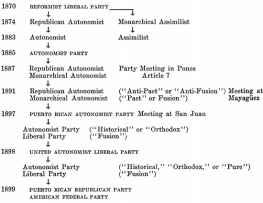PREFACE
The study of the history of the people of the Appalachian mountains must be written with great care. The rediscovery of poverty in West Virginia in the early 1960s has created a widespread stereotyped image of the region and its inhabitants. The result is that the historian is tempted to concentrate on those events that help to explain the present situation. This approach to the period between 1865 and 1900 would distort seriously the contemporary southern mountain peoples view of their own times and would obscure some important developments. These years were a time of hope for the mountain people, for the promise of industrialization hid many of its consequences. At the same time, the historian must be aware of the developments in the twentieth century and, where appropriate, point out the origins of the tragic social and economic problems that have plagued the area.
All efforts to achieve a balanced approach to Appalachian history are hampered by the absence of scholarly studies of the regions past. Much of the material on the mountain people has been written by advocates who were more concerned about proving a point than about understanding the complexity of the situation. This study itself has changed drastically since it was first conceived. The original outline of the project envisioned a largely statistical study of the political developments in the region. That plan had to be modified because much of the fundamental background of mountain politics remained undiscovered. In addition, few historical investigations of the social life of the mountain people have been undertakenalthough Ron Eller at Mars Hill College will shortly complete one. Thus, it was necessary first to construct the basic narrative. Subsequent statistical tests revealed that the mountain people formed a relatively homogeneous ethnic and religious group. This part of the work showed little unexpected information, and much of it became an appendix to the manuscript, rather than its core. As a result the present text represents an effort to relate the political history of one segment of mountain society and explain the wider implications of these developments.
Defining what constitutes Appalachia, particularly in the late nineteenth century, is a difficult task. Each author who deals with the region has used different criteria and the result is confusion. For this study I have included the following counties as being part of Appalachia on the basis of geographical location and economic characteristics. Kentucky: Bell, Boyd, Breathitt, Carter, Clay, Clinton, Cumberland, Elliott, Estill, Floyd, Greenup, Harlan, Jackson, Johnson, Knott, Knox, Laurel, Lawrence, Lee, Leslie, Letcher, Lewis, McCreary, Magoffin, Martin, Menifee, Morgan, Owsley, Perry, Pike, Powell, Pulaski, Rockcastle, Wayne, Whitley, Wolfe; North Carolina: Alexander, Alleghany, Ashe, Buncombe, Burke, Caldwell, Catawba, Cherokee, Clay, Cleveland, Gaston, Haywood, Henderson, Lincoln, McDowell, Macon, Madison, Mitchell, Polk, Rutherford, Swain, Transylvania, Watauga, Wilkes, Yancey; Tennessee: Anderson, Bledsoe, Blount, Bradley, Campbell, Carter, Claiborne, Cocke, Cumberland, Grainer, Greene, Hamblen, Hamilton, Hancock, Hawkins, James, Jefferson, Johnson, Knox, Loudon, McMinn, Marion, Meigs, Monroe, Morgan, Polk, Rhea, Roane, Scott, Sequatchie, Sevier, Sullivan, Unicoi, Union, Washington; Virginia: Alleghany, Bath, Bland, Botetourt, Buchanan, Carroll, Craig, Dickenson, Floyd, Giles, Grayson, Highland, Lee, Montgomery, Pulaski, Roanoke, Russell, Scott, Smyth, Tazewell, Washington, Wythe; West Virginia: Barbour, Braxton, Brooke, Cabell, Calhoun, Clay, Doddridge, Gilmer, Hancock, Harrison, Jackson, Kanawha, Lewis, Lincoln, Marion, Mar-hall, Mason, Monongalia, Nicholas, Ohio, Pleasants, Pocahontas, Preston, Putnam, Randolph, Ritchie, Roane, Taylor, Tucker, Tyler, Upshur, Wayne, Webster, Wetzel, Wirt, Wood. The major difference between this list and many of the others is the exclusion of some West Virginia counties. Richard O. Curry argues persuasively in A House Divided: A Study of Statehood Politics and the Copperhead Movement in West Virginia (1964) that there were two distinct groups of counties in that state. I have followed Currys division and limited most of my work to the original Unionist counties in the northwestern part of the state.
These counties in the five-state area formed the population base for the statistical analysis of the mountain people and their politics. Several individuals and institutions have offered me assistance with the preparation and analysis of the quantitative data used in this study. The National Science Foundation gave me a grant that allowed me to attend a summer session at the Inter-University Consortium for Political Research in Ann Arbor, Michigan. The classes at the consortium were of great assistance to me in preparing the study. In addition, the consortium made available a great deal of election and census data, which form the basis for that part of this manuscript. All of the conclusions are mine, however, and the consortium is not responsible for any of the assertions made in the statistical analysis of their data. John Curtis of Valdosta State College and John Blydenburgh of Clark University aided with crucial advice at several points in the data analysis process.
I am also indebted to a number of libraries and research institutions for their assistance in locating manuscript collections dealing with mountain politics. The staffs of the following institutions have greeted me with courtesy and extended professional advice about their holdings: Chattanooga Public Library; Duke University Library; Filson Club Library; Kentucky Historical Society; Lawson McGhee Library and the East Tennessee Historical Society; Library of Congress; New Hampshire Historical Society; North Carolina Department of Art, Culture, and History; Northwestern University Library; University of Kentucky Library; University of Louisville Law Library; University of North Carolina Library; University of Tennessee Library; University of Virginia Library; West Virginia University Library; Valdosta State College Library; West Virginia Department of Archives and History; and the College of William and Mary Library. Miss Pollyanna Creekmore, formerly of the East Tennessee Historical Society and Lawson McGhee Library and now at East Tennessee State University, introduced me to the field of Appalachian research and provided me with insights I could have gained in no other way. The late Dr. Virginia Gray and Dr. Mattie Russell were of especial assistance to me during my long stay at the Duke University Library. Miss Joy Trulock and the Reference Department at the Valdosta State College Library have worked with unfailing dedication and ingenuity to find and secure copies of rare documents and newspapers for me.






